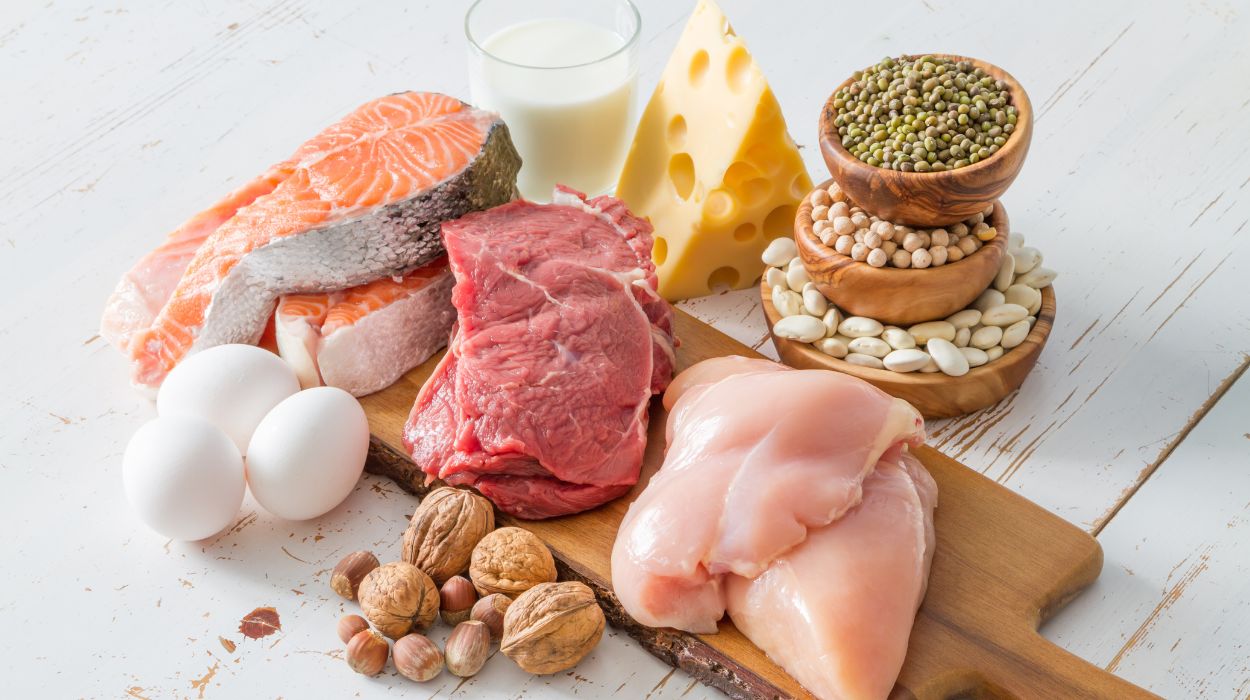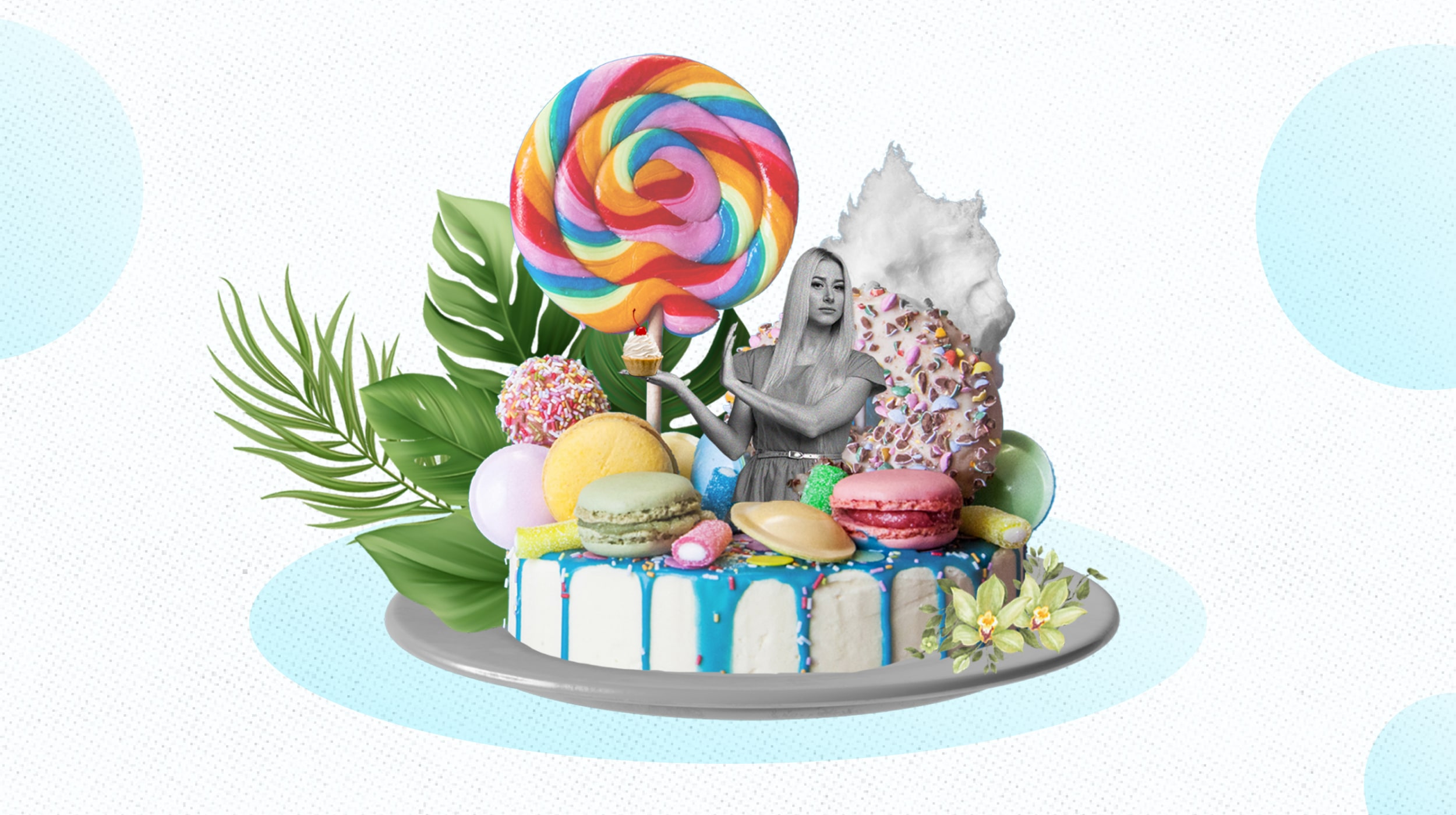You are finding the answer to the question: How to stop sugar cravings? Because you find yourself reaching for sugary snacks throughout the day, unable to resist the cravings? You’re not alone. According to the Centers for Disease Control and Prevention,[1] the average American consumes over 17 teaspoons of sugar daily, exceeding the recommended limit[2] of 9 teaspoons, or 36 grams of sugar.
Excess sugar intake can lead to a host of health problems, from obesity to diabetes. Therefore, if you’re among the many people who struggle with sugar cravings, it’s important to take action to break free from the cycle of addiction. With the right strategies, you can train your brain to crave healthier options and reduce your dependence on sugar. In this article, we’ll explore 5 tips to help you fight sugar cravings and achieve a healthier, happier you.
How To Stop Sugar Cravings?
Here are some scientifically proven strategies to finally fight sugar cravings and regulate your hunger hormones:
- Eat protein-rich foods
- Get enough sleep
- Get moving
- Take probiotics and multivitamins
How To Stop Sugar Cravings?
If sugar craving is a regular part of your day, you know how difficult it can be to resist the temptation of a sweet treat. The good news is that you don’t have to give in to your taste buds every time they call.
Now you might be wondering: How to stop sugar cravings? Is it even possible to keep blood sugar levels stable when faced with tempting sweet treats? Let’s explore a range of practical strategies that can help you prevent cravings.
Eat Protein-Rich Foods

One of the most effective ways to satisfy your sweet tooth without consuming excess sugar is to enrich your diet with protein and fat. Studies have shown that eating protein-rich foods regularly can result in fewer food cravings and reduce the likelihood of reaching for too much sugar. In addition, a protein-rich diet can regulate your appetite and help prevent obesity.[3]
The thing is that protein is a good source of healthy fats, which are important for overall health. Most importantly, receiving protein can stabilize sugar levels and keep you feeling fuller throughout the day.
However, it’s important to maintain a balanced diet and not solely rely on protein and fat. Consuming too much of these nutrients is accompanied by side effects such as higher cholesterol[4] and an increased risk of heart disease. Therefore, it’s important to also include a variety of fruits, vegetables, and whole grains in your diet to ensure that you’re getting all the necessary nutrients for a balanced and healthy diet.
Incorporating the following protein-rich foods into your diet can help you eat real food and change your sugar habit:
- Eggs
- Greek yogurt
- Nuts and nut butter
- Lean meats (Chicken, turkey, beef)
- Fish and seafood
Get Enough Sleep
Poor sleep habits may be more closely associated with sugar cravings than you think. The truth is that when you’re sleep-deprived, your body craves more energy to keep you going. And what’s the quickest source of energy? You guessed it – sugar. The reason is that lack of sleep affects the hormones[5] that regulate our appetite. This, in turn, contributes to the release of the “hunger hormone,” ghrelin, and increases blood glucose levels. This can lead to a vicious cycle of poor sleep, sugar cravings, and weight gain.
On the other hand, getting more sleep[6] reduces the desire for sugary junk food. Therefore, to keep your blood sugar stable, it’s essential to get enough sleep every night. Aim for 7-9 hours of sleep per night to keep your hormones in check and reduce sugar cravings.
Keep in mind that while poor sleep habits can contribute to sugar cravings, getting more sleep will only help if the reason for the cravings is related to a temporary poor sleep routine. However, if someone has sleep disturbances such as snoring or apnea, they may need additional medical support to improve their sleep patterns.
Get Moving

Finally, even if it sounds like a long-term plan, getting physically active can have a significant impact on reducing sugar cravings. You don’t necessarily need to start doing heavy workouts in the gym or engage in extreme physical activities. Instead, even simple physical activities can help alleviate your cravings.
According to a study published at the University of Innsbruck,[7] a 15-minute brisk walk can relieve the urge to consume sugary snacks in response to stressful situations. This means that simply incorporating regular movement and exercise into your daily routine can make a big difference. So, whether it’s taking a brisk walk, trying a new fitness class, or simply engaging in more active hobbies, finding ways to move your body will help you curb sugar cravings and improve your overall health.
Take Multivitamins And Probiotics
These supplements support gut health and reduce inflammation, which may contribute to sugar cravings.[8]
Take Multivitamins
Did you know that food cravings are related to vitamin deficiency? For example, people who lack vitamin B-12 often crave sweets and carbs. Their bodies are simply trying to make up for the missing nutrients.
One way to curb sugar cravings is to ensure that your body is receiving all the nutrients it needs to function properly. While there is no definitive evidence linking nutrient deficiencies to sugar cravings, some researchers believe that certain vitamins and minerals may play a role. Therefore, incorporating the best vitamins for energy, such as B vitamins and iron, into your diet might reduce cravings by providing needed nutrients for your body. However, it’s important to note that taking multivitamins alone may not be enough to completely eliminate sugar cravings.
Some of the top vitamins and minerals to look for include
- Vitamin B
- Magnesium
- Vitamin C
- Vitamin D
- Chromium
- Zinc
Nevertheless, here’s what you should know: vitamins should not replace a healthy diet, but rather supplement it. So, in addition to taking the best vitamins for energy, be sure to focus on eating a healthy diet.
Take Probiotics
If you’ve ever heard anything about the importance of your gut bacteria[9] for your health, you may not be surprised to learn that your gut microbiome is also responsible for your sugar cravings.
A recent preclinical animal study published in the journal Current Biology[10] has shown that poor gut health, including an imbalance of gut bacteria, may have an impact on eating behavior, including the consumption of sweet foods. However, since the study was conducted on mice, further research is needed to confirm these findings in humans.
Therefore, it’s hypothesized that taking care of your gut health is the most effective way to curb sugar cravings. The most optimal way to improve your gut health is to incorporate probiotics into your diet. You can increase your probiotic intake either by taking supplements. For instance, the best probiotic for men can help your sugar craving and promote overall health.
Alternatively, you can include the following probiotic-rich foods in your diet:
- Yogurt
- Kefir
- Kimchi
- Sauerkraut
- Miso
- Tempeh
- Kombucha
Tips To Prevent Sugar Cravings
While stopping sugar cravings at the moment can be helpful, it’s equally important to prevent them from happening in the first place, especially for those who are inclined to crave sugar frequently.
Here are some tips to avoid certain triggers and prevent craving sugar:
Avoid Acid-Forming Foods
Many processed foods that are high in sugar and artificial ingredients can be considered acid-forming foods. The acidic environment also makes it more difficult to maintain a healthy pH balance, which is essential for optimal health. Therefore, it’s important to limit processed foods and consume more whole, nutrient-dense foods that can help maintain a healthy pH balance in the body. Acid-forming foods are speculated to increase the chances of kidney stones and muscle and bone deterioration.
While natural sugars found in fruit juice and other foods are not as harmful, highly processed carbohydrates lead to an acidic environment in your body, which can trigger cravings for more sugar.
Instead, focus on eating more whole foods and limiting your intake of packaged snacks and other junk food.
Choose Your Diet Mindfully
The food we eat plays a significant role in determining our overall health, including our sugar cravings. That’s why it’s important to choose your diet mindfully. Instead of reaching for junk food, a candy bar, or breakfast cereals loaded with added sugar, focus on eating real food, full of needed nutrients and minerals.
One easy way to start is by incorporating healthy foods into your diet that can help curb sugar cravings. For example, sesame seeds, which are packed with healthy fats and fiber, can help keep you feeling full and satisfied. Maple syrup or fresh fruits, is also a great alternative to processed sugar when used in moderation. Dark chocolate is actually full of antioxidants that can improve your health and decrease the risk of heart disease.
By making mindful choices about what we eat, we can create a healthy and sustainable approach to managing our sugar cravings. So choose wisely and enjoy the benefits of a healthier diet.
Focus On Your Eating Techniques
Many of us eat mindlessly, without paying attention to the food we are consuming. Unfortunately, that’s a common reason for overeating. When it comes to preventing sugar cravings, focusing on your eating techniques can be extremely helpful.
One technique you can use is mindful eating. This involves being present and fully engaged in the act of eating, as well as making conscious food choices and controlling your portions. Even if it sounds trivial, it turns out that mindful eating contributes to a decrease in the consumption of sweets.[11]
So, take the time to appreciate the colors, textures, and flavors of your food. Chew slowly and savor each bite. By being mindful of your eating, you will not only enjoy your food more but also become more in tune with your body’s hunger and fullness cues.
Manage Stress
The final tip for preventing sugar cravings is to manage your stress levels. Even though stress isn’t directly related to our cravings, it’s a common trigger for them. The truth is that when we feel overwhelmed or anxious, our body releases the hormone cortisol, which can cause us to crave sugary foods as a way to cope. As a result, people sometimes engage in binge eating or even develop eating addictions. That’s why managing stress is crucial to preventing sugar cravings.
To avoid excess stress, try to incorporate relaxation techniques into your daily routine. This could include things like yoga, meditation, or simply taking a few deep breaths when you’re feeling stressed. Another effective technique for preventing sugar cravings is diversion. Getting busy doing other things rather than eating may help distract you from your cravings. For instance, you could go for a walk, read a book, or call a friend. These activities can help you shift your focus away from food and reduce your cravings. Additionally, make sure to get enough sleep[12] and exercise regularly, both of which can help reduce stress.
Remember, reducing stress can not only help prevent sugar cravings but also improve your overall well-being.
What Causes Sugar Cravings?
People who experience sugar cravings often believe that they’re just naturally drawn to sugary foods and that there’s not much they can do about it. However, the truth is that sugar cravings are often caused by a combination of specific physiological and psychological factors.
The most common factors that contribute to sugar cravings include:
- Stress
- Lack of sleep
- Boredom
- Emotional eating habits
- Inadequate protein intake
Occasionally, sugar cravings can be caused by some underlying mental health conditions or predispositions, such as:
- Hormonal imbalances
- Nutrient deficiencies
- Brain chemistry imbalances
- Genetic predisposition[13]
However, craving sugar due to serious medical problems is less common, and the above factors are not typically the main cause of sugar cravings for most people.
Regardless of the specific reason why you crave sugar, the basic mechanism of your hunger and sugar cravings is the same. In fact, sugar causes rapid blood sugar spikes, which then triggers your body to release insulin to bring those levels back down.
Sometimes, the insulin overshoots and leads to blood sugar drops, which can make you feel hungry and crave more sugar. Similarly, when the body becomes resistant to insulin, it has trouble using glucose for energy, which can lead to high blood sugar levels and an increase in insulin production. This can result in a cycle of cravings and weight gain.
According to a 2016 study[14] published in the European Journal of Nutrition, the effects of sugar addiction, withdrawal, and relapse are similar to those of drug abuse. The reason is that sugary sweets activate the same reward pathways in the brain as cocaine and heroin. This means that consuming sugar leads to a cycle of dependence and cravings that is comparable to that of addictive drugs.
Benefits Of Stopping Sugar Cravings
Other than feeling immediate satisfaction after you combat sugar cravings, there are numerous science-backed benefits to cutting down on sugar. Let’s see how this simple change can improve your health and well-being:
Improved Immune System
Perhaps not surprisingly, excessive sugar intake is detrimental to our immune system. Studies have shown that high amounts of glucose[15] can suppress our immune system by reducing the ability of white blood cells to fight off harmful pathogens.
How does this impact our overall health?
When our immune system is weakened, we become more susceptible to infections, viruses, and illnesses. It also leads to chronic inflammation, which is linked to a variety of health issues such as heart disease, diabetes, and certain cancers.
On the other hand, reducing sugar intake will reduce its adverse effects on their immune system. That’s why it’s important to understand how to lower blood sugar and incorporate a balanced diet that is low in added sugars.
Sustainable Weight Loss
While eating sugar provides a quick burst of energy, it can also lead to weight gain if consumed excessively. Surprisingly, this applies to artificial sweeteners as well.
In fact, a systematic review published in the Canadian Medical Association Journal found that artificial sweeteners, which are often used as a sugar substitute, didn’t help people lose weight. Instead, consumption of nonnutritive sweeteners has been associated with weight gain and even obesity.
While natural sugars and artificial sweeteners create a cycle of cravings and overeating, reducing their intake can lead to sustainable weight loss in the long run.
Better Mental Health
Not only does reducing sugar intake have physical benefits, but it also has a positive impact on our mental health. This is due to the direct link between craving carbohydrates and the risk of depression.
In fact, according to a 2017 study,[16] sugar intake from sweet food or beverages has long-term negative effects on psychological health. On the other hand, a lower sugar intake is associated with better psychological health. One reason for this is that sugar consumption can lead to rapid spikes and drops in blood sugar levels. This, in turn, affects our mood and energy levels.
Therefore, the benefits of reducing sugar intake go beyond just physical health – it can also have a positive impact on our mental health and overall quality of life.
Conclusion
Sugar cravings can leave us feeling tired, irritable, and constantly seeking out sugary treats. However, learning how to stop sugar cravings will benefit our overall health and well-being.
Try to avoid excess stress, take control of your diet and eating techniques, and you’ll eventually notice significant progress towards breaking free from sugar. Keep in mind that curbing sugar cravings is not just about immediate gratification, but rather the long-term benefits of a healthy lifestyle.
Frequently Asked Questions
Vitamin deficiencies that have been associated with sugar cravings include vitamin B1 (thiamine), vitamin B3 (niacin), and magnesium. These nutrients play important roles in energy metabolism and maintaining stable blood sugar levels. A deficiency in any of these nutrients can result in sugar cravings and other symptoms.
The recommended daily limit for sugar intake varies depending on age, gender, and activity level. According to the American Heart Association, women should aim for no more than 6 teaspoons (25 grams) of added sugar per day, while men should aim for no more than 9 teaspoons (36 grams) per day.
On average, it takes around 4 weeks for sugar cravings to go away. However, this varies depending on the individual’s level of sugar addiction, diet, and lifestyle factors. While it is possible to reduce and manage sugar cravings, they may not go away completely. But with consistent effort and healthy habits, they can become less frequent and less intense over time.
While artificial sweeteners may provide a lower-calorie alternative to sugar, they are not necessarily a good substitute. Some studies suggest certain sweeteners contribute to weight gain instead of weight management and can even lead to other health issues when consumed in excess.
 Expert's opinion
Expert's opinion
